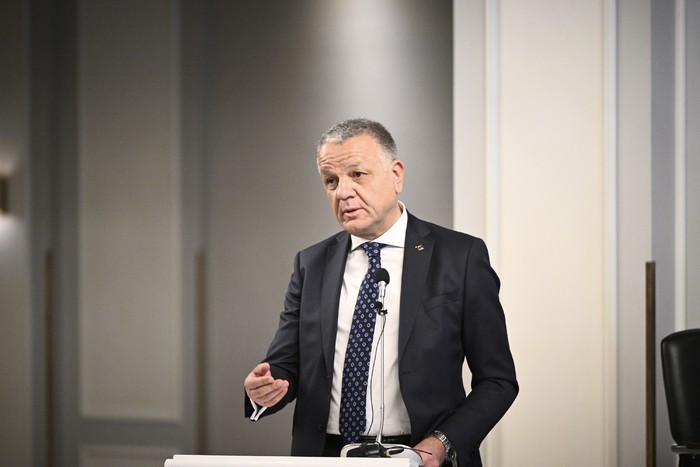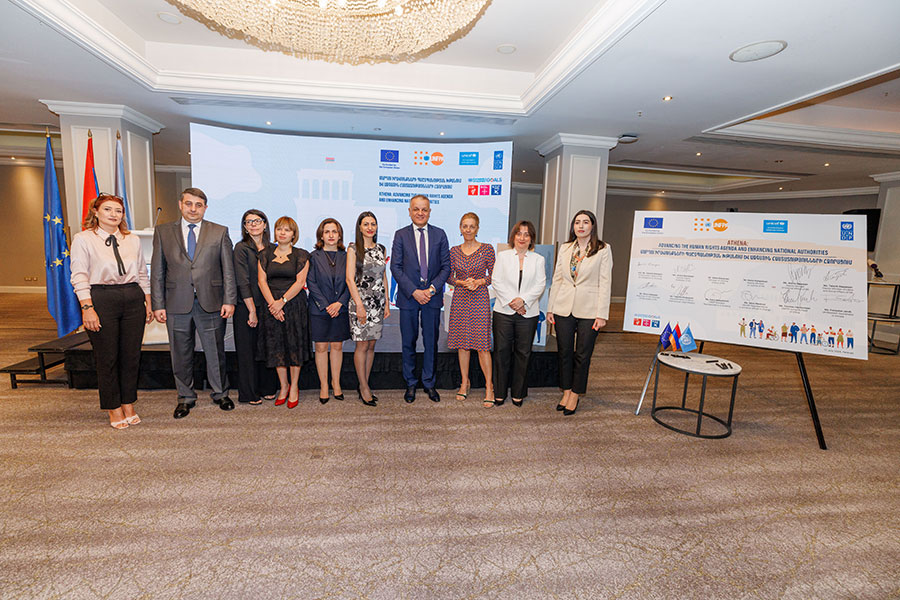17 July, 2024, Yerevan, Armenia – Today, the United Nations Development Programme (UNDP) in Armenia, together with UNICEF and UNFPA, launched a new 3-year, USD 2.5 million “ATHENA: Advancing the Human Rights Agenda and Enhancing National Authorities” project, funded by the European Union (EU).
The project, under the overall coordination of UNDP, will support further development of the institutional capacities and strategic communication of the Human Rights Defender’s Office, the Ministry of Justice, the Ministry of Internal Affairs, the Ministry of Labour and Social Affairs, the Office of the Representative on International Legal Matters, the Chamber of Advocates, and Public Defender’s Office to protect and promote human rights and drive forward the modern public policy agenda, as well as enhance the relevant competencies of the staff of these institutions.
H.E. Mr. Vassilis Maragos, Ambassador, Head of the EU Delegation to Armenia, Karen Karapetyan,
Deputy Minister of Justice of the Republic of Armenia, Anahit Manasyan, Human Rights Defender of the Republic of Armenia, gave keynote speeches at the event, moderated by Natia Natsvlishvili, UNDP Resident Representative in Armenia.
Read also
The event participants, which included representatives of key government institutions, donor community, civil society organizations, were welcomed also by Arpine Sargsyan, Deputy Minister of Internal Affairs of the Republic of Armenia, Tatevik Stepanyan, Minister of Labour and Social Affairs of the Republic of Armenia, and Françoise Jacob, UN Resident Coordinator in Armenia.
“The EU and Armenia are committed to protecting and promoting human rights, the rule of law and democratic values. Among our past achievements are the new patrol police service, launched nationwide, with 2,300 police officers trained, the establishment of the new regional office of Human Rights Defender, training and capacity building provided to the Police educational complex and establishment and functioning of the HRD child youth council. We will continue working with all stakeholders, including civil society, to develop accountable institutions and strengthen the human rights-approach to services provided to citizens,” said Head of EU Delegation to Armenia, EU Ambassador Vassilis Maragos.
Karen Karapetyan, Deputy Minister of Justice of the Republic of Armenia highlighted , “I highly appreciate the initiative of the “Advancing the Human Rights Agenda and Enhancing National Authorities” project funded by the EU and implemented by UNDP, UNICEF and the UNFPA, which is of key importance in the issues of protection, promotion and strengthening of the rule of law in Armenia. Considering the Ministry of Justice’s previous achievements within EU and UN-implemented programs, I have full confidence that this project will further contribute to our dedication to human rights protection and the effective implementation of the Human Rights 2023-2025 Action Plan, while also enhancing the capacities of the Ministry of Justice.”
Anahit Manasyan, the Human Rights Defender of RA sees the project-based cooperation implemented by the UN agencies as an opportunity provided by the European Union to advance the work aimed at the protection and promotion of human rights throughout the country, especially through integrating international and European human rights standards. This cooperation anchored in the universal and indivisible character of all human rights must stand as an example to be followed.
Within the framework of the project, the CSOs and the expert community will engage with the government institutions in a regular and informed dialogue on public policy issues, expanding the thematic areas from protection of human rights, children’s rights, refugees rights, gender equality, fight against gender based and domestic violence, to other issues, such as police, justice and constitutional reforms, and sustainable development.
More specifically, in the next three years, UNICEF will work with HRDO to strengthen child rights and child rights monitoring capacities, as well as support the Government to develop an action plan based on the CRC concluding observations. The agency will also bring together various local and national Government and civil society partners to establish two safe corners for children victims of violence in line with the international Barnahus model. In addition, together with the Ministry of Justice and the Council of Justice for Children, UNICEF will further strengthen institutional capacities to coordinate access to justice for children, as well as support the Government in the introduction of specialized services for children in conflict with or at risk of being in conflict with the law.
______________________
This publication was produced with the financial support of the European Union. Its contents are the sole responsibility of the “ATHENA: Advancing the Human Rights Agenda and Enhancing National Authorities” Project and do not necessarily reflect the views of the European Union.



























































